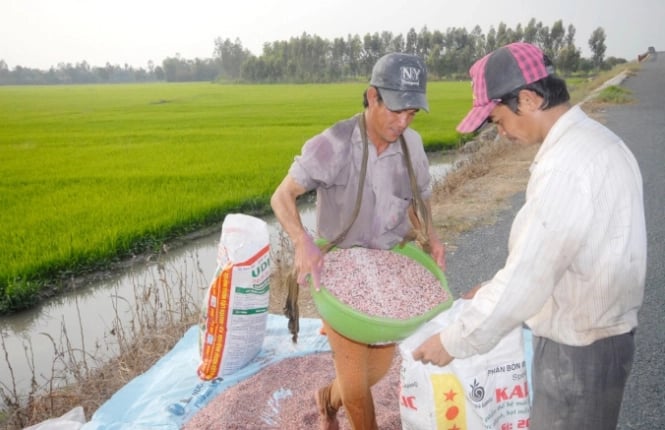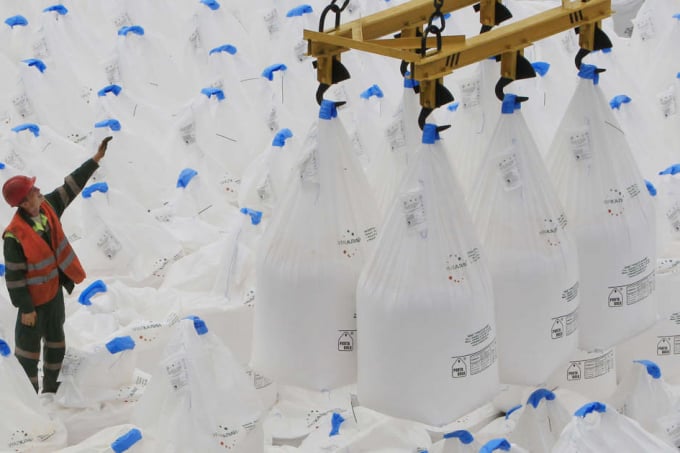October 10, 2025 | 10:20 GMT +7
October 10, 2025 | 10:20 GMT +7
Hotline: 0913.378.918
October 10, 2025 | 10:20 GMT +7
Hotline: 0913.378.918
On April 29, the Ministry of Agriculture and Rural Development (MARD) sent the Ministry of Finance (MoF) Official Dispatch No. 2692/BNN-BVTV on fertilizer demand in 2021 and demand forecasting for fertilizer in 2022

Farmers have been suffering a lot from increasing fertilizer prices. Photo: Le Hoang Vu.
According to the MARD, chemical fertilizer demand in Vietnam is more than 10 million tons every year on average. In 2021, the demand was 10.7 million tons including 7.2 million tons manufactured domestically and 5.1 tons imported from overseas. During the same period, Vietnam exported 1.6 million tons of fertilizers. It's predicted that demand for fertilizers in 2022 will be not much volatile compared to 2021.
From the beginning of 2021 until now, fertilizer prices in both international and domestic markets have continued setting new highs, affecting agricultural production, competitiveness of agricultural produce and farmers’ life, especially amid challenging time caused by natural disasters and pandemic.
Global fertilizer market has been impacted significantly as the Covid-19 pandemic has disrupted supply chains, causing supply shortages. Russia-Ukraine crisis is now making the situation worse. In addition to the conflict, a variety of sanctions imposed by the European Union and the United States of America on Russia have instantly cut off the supply and driven up prices of fertilizers.
In the near future, domestic fertilizer market will be extremely complicated and unpredictable in terms of price and supply, especially for potassium as nearly 50% of global potash comes from Russia and Belarus and Vietnam relied entirely on imports.
With soaring fertilizer prices in recent months, causing costs of agricultural production to increase, farmers are likely to suffer the most.
In the face of these problems, the MARD asked the MoF to propose the amendment of Law No. 71/2014/QH13 to the Government. Accordingly, fertilizers will be put in the category of taxable objects instead of non-taxable objects but at rational tax rates in order to support domestic fertilizer manufacturers and farmers in the context of high fertilizer prices and supply shortages.
At the same time, the MARD will consider export tax regulations imposed on fertilizers, particularly Urea, DAP and MAP; coordinating with the relevant ministries and agencies to take measures on controlling exports of Urea, DAP and MAP in order to guarantee the supply for domestic demand.

In the near future, domestic fertilizer market will be extremely complicated and unpredictable in terms of price and supply.
The MoF is also getting opinions from the people to the Draft Decree on preferential export-import taxes, List of goods and absolute tax rates, mixed taxes, and non-quota import duties including amendment of Most Favoured Nation (MFN) tariff for fertilizers.
According to the Draft, to lower domestic fertilizer prices and stabilize supply, the MoF proposed suggestion to the Government for export tax rate of 5% for fertilizers in the categories of 31.02, 31.03, 31.04, 31.05 regardless of the proportion of minerals in fertilizers. Thereby, fertilizers manufactured with the value of natural resources and minerals along with energy cost less than 51% of product cost is taxed at 5%, up from 0%. The rates imposed for other categories will remain unchanged.
The MoF said that the plan on increasing export tax aimed to guarantee domestic fertilizer supply and harmony of interest between the State and enterprises.
According to current regulations, fertilizers are exempted from value-added tax. For that reason, domestic fertilizer manufacturers are not eligible for declaration, deduction and refund of input value-added tax. Therefore, they have to include all expenses in production costs, driving up prices of fertilizers. Because of high prices, enterprises find it difficult to compete with imported counterpart products and farmers will have to pay more for crop nutrients.
Translated by Mai Tham

(VAN) The European Commission has launched an inquiry into tightening European animal welfare regulations.

(VAN) Scientific research, international cooperation, and the quality of human resources are three key orientations for implementing commitments at the UNOC-3.

(VAN) The Department of Climate Change (Ministry of Agriculture and Environment) held a conference lately this week to discuss the topic ‘Implementing Viet Nam's Commitments at the COP26 Conference’.

(VAN) The Ministry of Agriculture and Environment has signed Decision No. 4024, approving the 'Low-emission crop production project for 2025-2035, with a vision to 2050'.

(VAN) The People’s Committee of Nghe An Province had requested measures to protect marine mammals to avoid the risk of being “flagged” by trade partners.

(VAN) To date, the system of legal documents regulating sustainable forest management and sustainable forest management certification has been increasingly improved, basically meeting practical requirements.

(VAN) The draft policy on soil health is regarded as an important step forward, contributing to a more comprehensive approach to soil quality management.